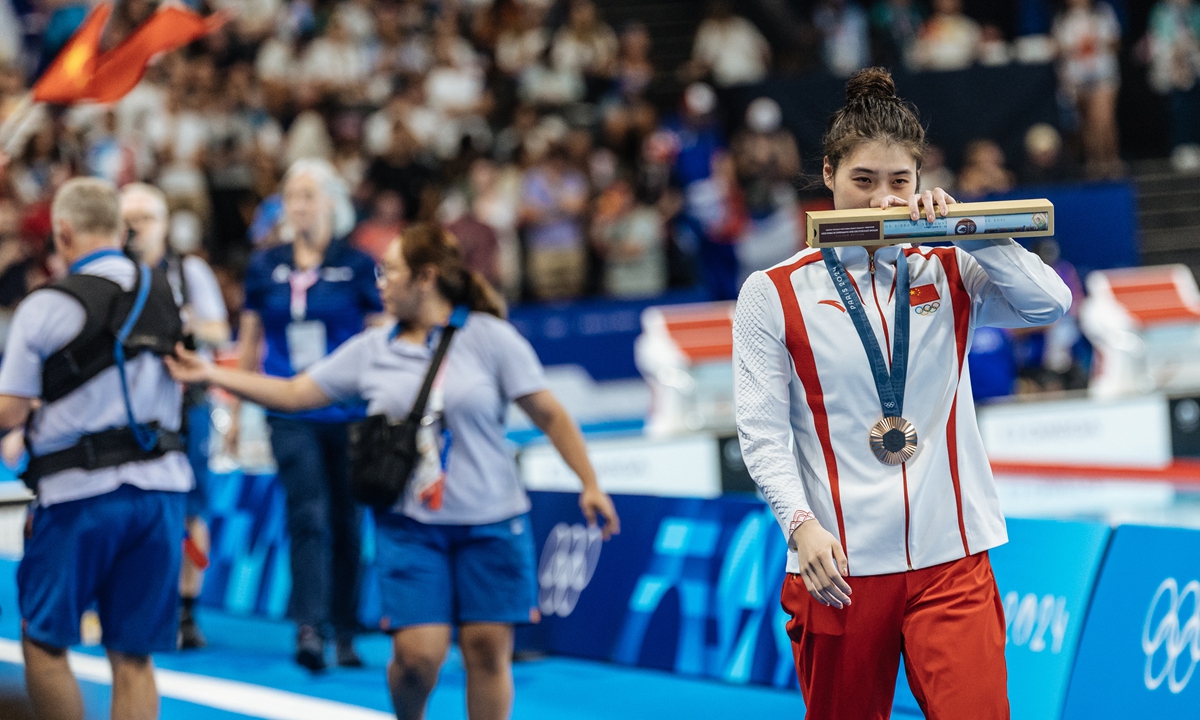
While waving and interacting with the audience after the medal ceremony, Zhang Yufei sheds tears in Paris, France, on July 28, 2024. Photo: Li Hao/GT
The Chinese swimming team's recent performances at the Paris Olympics have raised concerns about the impact of excessive doping tests on their preparation and performance.
Butterfly specialist Zhang Yufei's third-place finish in the women's 100 meters butterfly and breaststroke world champion Qin Haiyang's unexpected seventh-place result in the men's 100 meters breaststroke were the most discussed results on Chinese social media.
It is imperative to scrutinize the conditions under which they have been competing, particularly the frequency and timing of these tests, netizens said.
On Tuesday, Tang Qianting claimed silver in the women's 100m breaststroke, while Xu Jiayu added another silver in the men's 100m backstroke.
Two-time Olympic diving champion Gao Min has raised questions, claiming that the Chinese swimming team is subject to up to seven doping tests a day. She argues that these procedures, while ensuring fair play, might inadvertently hinder the performance of Chinese swimmers.
Gao said via her Weibo account on Monday that there's no doubt that something went wrong with the athlete's pre-competition training. "Personally, I think that taking seven doping tests a day disrupted the Chinese swimming team's performance," she said.
"Qin had the worst result in the past two years. I hope those who had said that gold medals are not important and that foreign athletes are more relaxed can stop it. If gold medals really aren't important to them, why are they so eager to test our Chinese swimmers so many times every day?" Gao asked.
Chinese swimmers have faced significantly more testing compared to their American counterparts since 2024. But none of them have blamed the exhausting drug tests, however, some admitted that they have faced a lot of pressure and needed to shake off the mental burden for the following competitions.
According to data from the Aquatics Integrity Unit, leading Chinese swimmers such as Zhang and Qin have undergone 19 and 22 anti-doping tests in 2024. Chinese swimmers at the Olympics have faced an average of 21 doping tests this year, compared to an average of six for the American team and four for the Australian team.
A glimpse into the daily routine of these athletes, unveiled by a Chinese volunteer on social media, shed a light on the taxing nature of their schedule.
At the Athletes Village in Paris, Chinese swimmers Zhang and Yang Junxuan wait at the Doping Control Center (DCC) as early as 5:30 am, while DCC agents and volunteers often have to go to the rooms of other athletes who are reluctant to take tests that early. The Chinese athletes, however, never opt for the easier route of delaying the tests, demonstrating their commitment to full compliance.
Despite securing the bronze medal and breaking the Asian record in the women's 4x100m freestyle relay, Zhang emphasized the importance of transparency and cooperation with anti-doping agencies despite the inconvenience and emotional strain of early morning tests.
"I don't think the frequent doping tests had a significant impact. It's just a bit frustrating to be woken up at 5 am for testing," said Zhang.
Facing international media, fellow Chinese swimmer Fei Liwei also confidently reiterated the team's dedication to clean competition and rigorous training after setting a new personal best in the men's 400 meters freestyle.
After the 100m breaststroke final, Qin told the Xinhua News Agency that he needed to overcome the mental burden. "I really wanted to win, but maybe my mindset wasn't well-adjusted enough. I would clear my mind and focus on the 200m breaststroke and the mixed relay later," Qin said.
Chinese swimmers are the most tested Olympians ahead of the Paris Games, according to the statistics released by World Aquatics on July 23.
On July 18, Yu Liang, the national swimming team nutritionist, said on his Weibo that during the 10 days spent in France, the 31 Chinese athletes had been tested nearly 200 times by the International Testing Agency, with each athlete being tested five to seven times on average, and this was on top of the regular training and the adjustment to the time difference the athletes had to go through.
As the narrative unfolds, it becomes evident that the Chinese athletes are caught in a dual struggle - striving for excellence while navigating an environment of intense scrutiny. The call for fairness in doping tests is not about seeking leniency but about ensuring that the spirit of competition remains just and equal for all.
While multiple factors influence athletes' performances, minimizing out-of-competition impacts is crucial. Ensuring fair and equal conditions will not only support athletes, but also enhance the overall excitement and integrity of the competition, and thrill fans worldwide.
The author is a Global Times reporter. life@globaltimes.com.cn




